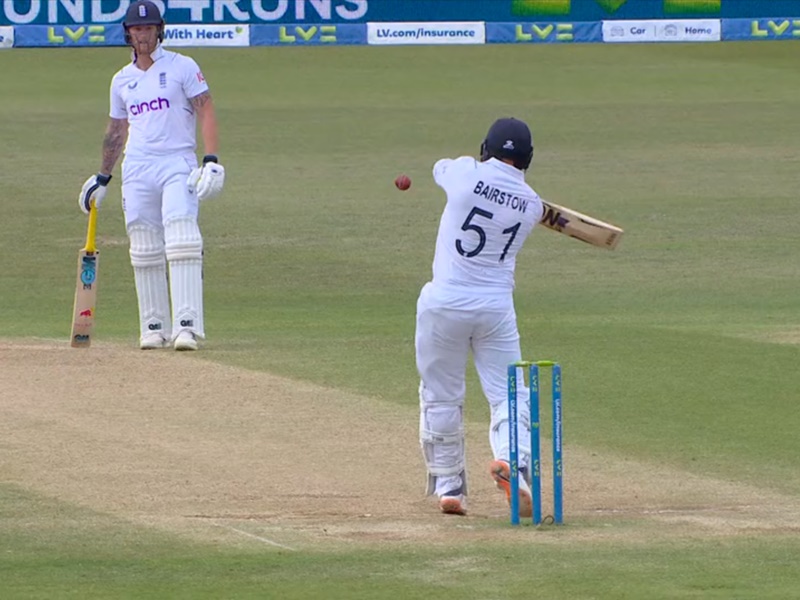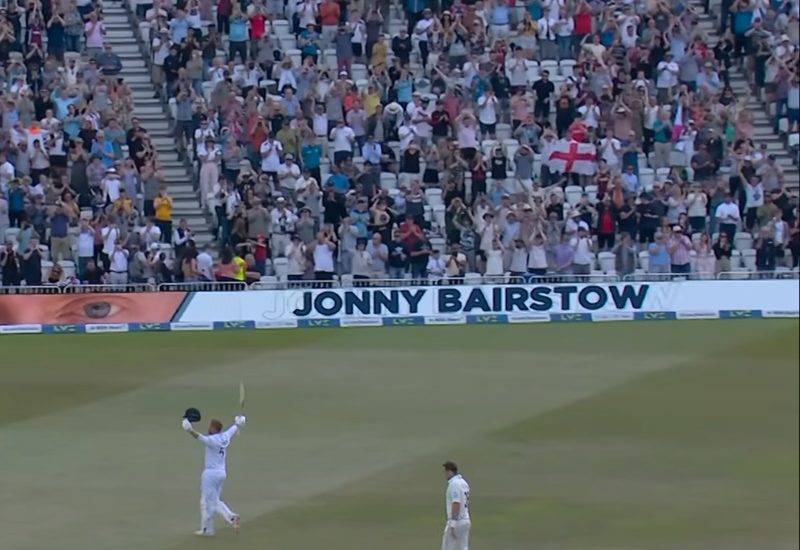Violence is great, isn’t it? Violence is so much fun. We greatly enjoyed Jonny Bairstow, at Trent Bridge, with a cricket bat.
At tea on day five, England were 139-4, 160 runs from victory and Jonny Bairstow was on 43 off 48 balls, which is quick, but still within the bounds of normality.
Straight after tea, England made 59 runs in four overs, 45 of which were scored by Bairstow, which is very much not normal – particularly in the context of a Test match, where you actually have a choice about how how you go about things.
In a limited overs match, circumstance forces your hand. Jonny Bairstow chose to do this.

It’s no great exaggeration to say that in that short passage of play, England went from losing the match to waltzing it. As tonal shifts go, it was reminiscent of the church scene in Kingsman.
If you don’t know Kingsman, it’s a knowingly daft and at times incredibly violent spy comedy. The church scene is by far the most violent and best.
The context is that Samuel L Jackson’s character has distributed free mobile phones to people and when he triggers them, they make a noise that somehow turns the owner into a frenzied murderer.
Colin Firth’s Harry Hart is in a church that very quickly goes from this…

To this…

There’s a comic quality to the scene, but as you can no doubt deduce, the comedy’s built on extreme frenetic violence, so bear that in mind if you want to actually watch it.
Everyone in the church goes nuts, but because Harry Hart is a highly-trained secret agent, he kills somewhere around 40 people all on his own.
Jonny Bairstow is Harry Hart.
Matt Henry bowled short. Jonny shot him in the gut.
Trent Boult bowled length. Jonny impaled him with a wooden pole and then shot him in the face.
Michael Bracewell pitched one outside off. Jonny set fire to his head.
For whatever reason, the part of the mind that asks you whether you’re sure you’re doing the right thing was switched off during the tea break and from that moment on Bairstow just got on with the simple reflex job of hitting the ball/murdering people.

The soundtrack to the church scene is the guitar solo from Lynyrd Skynyrd’s Free Bird. A fun game that you’re now too old to play is to listen to that solo and try and guess when it’s about to end. If you’ve only heard it once or twice before, you will be wrong dozens of times. It’s the rock guitar solo version of the climax of Dudley Moore’s Beethoven sonata parody, which has well over a minute of ‘ending’.
Bairstow’s innings had a similar multi-climactic quality. How do you follow a barrage of fours and sixes? With another barrage of fours and sixes, of course. Then another. Then you impale three people with a giant wooden spike. Then more fours and sixes.
Shackles are bad
There’s a lot of casting off of shackles in the headlines about England’s win. Writing in the Telegraph, Michael Vaughan has lauded Ben Stokes and Brendon McCullum for ‘ripping’ them off.
“It is the same team, more or less, but they have been freed up and it has totally changed their psychology,” says Vaughan.
It sounds such a simple instruction: “Shackles are bad, mmkay. Cast them off, mmkay.” But it really isn’t simple at all. As an illustration of the potential response the players are up against, it was only a week ago that Vaughan deemed a Jonny Bairstow dismissal “dumb” and “pathetic” when he was out trying to drive Kyle Jamieson.
“You can have all the preparation and team meetings, but until you play smart… See him off. Get rid of him. Play a defensive shot. It is just dumb,” he said.
This is not meant to highlight hypocrisy on Vaughan’s part. He’s probably right. That was a dumb shot from Bairstow. And this was a fantastic, liberated, freewheeling innings. Vaughan is calling it as he sees it, but England are viewing things differently because they want to steer Bairstow towards what they think will be a more effective approach overall.

McCullum’s philosophy is not really about throwing off the shackles, so much as it’s about not second-guessing yourself. Sometimes your first guess is wrong, but England’s new coach believes that second guesses can be wrong too and that being caught between two guesses will inevitably be wronger still. So the instruction is just go with what you think is right, be decisive, and we’ll back that overarching approach and forgive specific errors.
That is actually not an easy message to convey. As we’ve said before, you can tell a batter to play freely, but he’s not necessarily going to buy that unless you can somehow show him that it’s what you really want.
To resort to cliché, talk is hugely affordable and actions are more audible than words. It’s hard to properly assess the actions of New England at this early juncture, but a common theme is a broad expression of faith in some players, which by extension becomes a similar message to everyone else in the team.
In marked contrast to the previous regime’s management of Jack Leach, Stokes has often been at pains to say how much he wants someone around. He definitely wanted James Anderson and Stuart Broad to be available for selection, for example. He definitely wanted Ollie Pope in the side too, no matter where there was an opening – even if it was at number three where Pope had never batted before. McCullum has also sounded out Moeen Ali to see if he was willing to unretire.
> Captain Stokes v Captain Root
Crucially, they’re not saying they need these players because saying that would undermine other squad members. They’re saying they want them. Bairstow may well reason that if Stokes so desperately wants Pope in the side that he’ll bat him out of position, he must want Bairstow in the side even more. That must be a bit of a boost.

One day, “You’re all great! You’re all amazing!” might start to wear thin, but for now England players feel like the coach and captain have faith in them.
That’s also why you hear these coded non-criticisms like ‘the intent was right’ when a player gets out to a shit shot. It’s not a cop out. It’s a way of saying the batter made the wrong choice but in the right way. The aim is to be supportive of the approach in the belief that this will result in better returns for the team in the long run.
Reacting to the criticism of Bairstow’s dismissal last week, Stuart Broad said, “he could be happy that he committed to a certain way of playing and didn’t alter that.”
You could say the same about this knock.
We only have time to write these longer pieces because of the collective contribution of our Patreon backers. Patreonage starts at £1 a month, but you can cancel any time, so we suppose it starts at £1. Full details here.
It’s a free website though, with a free email, which you can sign up for here.




It sort of does though, doesn’t it.
Before any choice, there is only a best-guess as to whether or not it is the right one. As a previous boss of mine once said – do something right, do something wrong, do nothing, is the order in which you should approach things. He was happier with me making a mistake than avoiding the situation altogether. All you can do is pick what you think will work, and go for it.
Vaughan’s Lord’s comment is criticising someone for making a choice and doing it. It is saying, “You should have done nothing.” It is literally the easiest job in the world going round finding mistakes and telling people they should have done the other thing.
The question I would have for Vaughan is this. Given that it is extremely unlikely that Bairstow will have a better innings in his career, what would he advise him to do from now on? Pick an answer, and then drop yourself from ever commenting again if you turn out to be wrong.
Much (all?) of England’s problems over the last few decades have been exactly this – a management / journalistic approach that waits until you’ve failed and then calls for your head. The consequence is a set of players who do not feel free, who feel as if every shot choice might be their last ever in test matches. I’m surprised at Vaughan – he was the one person smiling at Edgbaston when Simon Jones put down that catch in 2005. He was the one saying, heads up lads, never mind, if we carry on like this we’ll get another chance.
Suppose all we’re saying is it’s two strands of criticism: specific, of a particular decision, and more general, of an approach or philosophy. A pundit has the hypocritical luxury of being able to take issue with one while lauding the other, even if there’s a contradiction in doing so.
What we really wanted to highlight was how Vaughan and others laud England’s carefree approach even though their roles and comments in those roles do so much to prevent the team playing that way.
The smart way of making specific criticisms is presumably to set them in the wider context and explain how it’s not so cut and dried as “dumb” and “pathetic”.
It also isn’t an on/off switch. I’m loathe to defend Vaughan, but there has to be some refinement – you can celebrate the wins while also highlighting the mistakes. To take the boss analogy, there is probably a 4th strand to it – do something right, do something wrong, do nothing, do the same thing wrong over and over again.
The Stokes first innings was probably an extreme version of that (maybe the most extreme I can remember). You can celebrate the way that he played before he got out, but that doesn’t completely absolve him from the stupid way that he got out, right? Just as him getting out doesn’t overwrite all the good stuff he did before it. And in his case, you could argue that he did refine it in the 2nd innings – perhaps because Bairstow was going mad, perhaps because his knee limited swinging out of his arse every ball.
To round it back to the Bairstow point, when he swished at Jamieson he was trying to batter his 4th boundary off his 15th ball on a wicket that had been hard to bat on. Bairstow was 13(25) with 1×4 at one point on a match flatter wicket yesterday.
Bert’s Back! I don’t mean he has……… you know the rest. Does this mean we will get a crossword this Christmas?
Chucks song (having taken good energy from it) then broadcasts to drag artist on the square (6,8)
I know that many here are not crossword people, and that’s fine. It is just a choice, and doesn’t imply anything about their intellectual capabilities. But I don’t want them to feel left out, so here is an alternative clue more suited to their level:
Ginger batsman, first name Johnny, who is the son of a Yorkshire cricketer called David Bairstow and who shares his surname, and whose whole name is Johnny Bairstow, which is the answer to this clue (6,8)
Do you not need to rearrange the two words into 1 across and 1 down for it to qualify as a crossword?
You know, for the crossing of the words?
You’d have to be dim to think that. The reason why you’re wrong is so obvious that I don’t need to spell it out. In fact, if you can’t see why you are wrong you must be dim. Therefore, either you can see why you are wrong, and therefore are dim, or you can’t see why you are wrong, and therefore are dim.
Crushing. We knew we were embarrassing ourself even as we typed it out.
Don’t worry about it, it’s an easy mistake. The question is, did you solve the clue?
There was a clue? Man these things are hard to unravel.
Is the answer to the crossword clue, Not worth it?
Also important that they waited until the ball was old and the bowlers were knackered before activating beast mode. Aggression, but not mindless aggression.
Bullying, but it doesn’t feel uncomfortable because they’re bullying the best team in the world, and England are crap. The template for all great action films – underdog, justified, hideous violence. Nothing like it
Can any of us spake yet? Just as I thought I might be able to, Lancs went and did a mini-England at Edgbaston.
The other thing that links those two games is that I could/should have been at the denouement of both/either, were it not for a much more prosaic commitment in the Midlands this week that also prevented me from commenting on here for a bit.
The Midlands is one big prosaic commitment.
Speaking of brilliant batting brutality, I think I’ve got a new favourite cricketer.
https://www.youtube.com/watch?v=iUVXWNrW_VA
Sarah Wetoto of Kenya has an obvious superficial resemblance to Dwayne Leverock or an Olympic shotputter and she bats like she’s wielding a sledgehammer. It’s glorious, and far faster than the typical run rate in women’s T20s. Plus she bowls lovely spin. This highlights reel doesn’t do her justice, particularly the bowling (her bowling average in T20Is is 9.78 – admittedly the opposition she faces tends to be weak, since the top 12 countries rarely play Kenya), but there’s some other bits on youtube if you look around for it.
Speaking of whamtastic willow-wielders, it’s a source of great regret there’s no archive footage of Fiji’s Ilikena Lasarusa Talebulamainavaleniveivakabulaimainakulalakebalau who is occasionally named, alongside the likes of Gilbert Jessop, as one of those “people who were in completely the wrong era to play limited overs cricket” on account of his astonishing six-hitting, as well as “people who really ought to have played Test cricket but was born in the wrong country to do so”. In a club match in Suva he hit 22 sixes in a score of 246, so more than 53% of the runs were from maximums; on a first-class tour of New Zealand he hit a century in an hour against Canterbury which included eight sixes and five fours. The distance he struck his sixes seems to have left a particular impression on observers, and it would have been interesting to see what he could achieve with a modern bat. If we believe what is said online, his name means “returned alive from Nankula hospital at Lakemba island in the Lau group”; the few surviving photos of him suggest he had a surprisingly lithe physique – as did Jessop. I suspect both of them would have enjoyed that last session at Trent Bridge.
I dread to think what my pronunciation of the name : “Ilikena Lasarusa Talebulamainavaleniveivakabulaimainakulalakebalau” would sound like after two or three G&Ts.
It doesn’t sound too special first thing in the morning after two or three strong coffees.
Meh!
Preferred the other 59 Sri Lanka had to hit off the last 3 (3, not some pantsy 4) overs to beat Australia in their last T20. That was quite epic to watch.
Yeah, I know, it’s T20, but the pitch at Trent Bridge was naff for bowling and no Jamieson to call on, and why the heck Wagner wasn’t playing is beyond my current thought processes, which have been somewhat limited by apathy.
Maybe NZ can put the Universe back in order by winning by an innings and something-hundred runs, thereby negating England’s series win.
https://ibb.co/1f9m2VJ
https://ibb.co/6YvrbCB
Presented without comment.
Those guys have their own vehicles. They don’t need their boss’s.
I’ve always felt that there is no such thing as a bad shot, just a badly played one.
Obviously I’m no Test player. But I am glad that people are finally thinking like this at Test level.